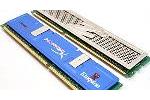 |

|
| News Rubrik |
|
Alle Hardware News CPU News Gehäuse News Grafikkarten News Kühler News Mainboard News Netzteil News Speicher News Sonstige News Sponsoren News |
| Hardwarespot.de |
|
Hersteller Auswahl News Archiv Kurznews Impressum Forum |
| ocinside.de Portale |
|
Redaktion ocinside.de ocinside.de Fanshop Funkyhome.de |
| Empfehlung |
|
|
| Speicher News | Freitag, den 28.09.2007 | ||||
| |||||
| News Archiv | ||
|
Hardware News Archiv nach Datum anzeigen Aktuellste News und Testberichte von Kingston: |
| Sprachauswahl |
|
|
| Empfehlung |

|
| RSS Feeds |
|
|
 Overall, the Kingston performs better in 2D applications when it's running at 1,333MHz with its default timings, whereas the OCZ seems to run better at 1,066MHz with lower latencies. On average there's a couple of memory heavy situations, like Xvid encoding, where the Kingston is just simply faster than the OCZ. This isn't reflected in 3D where the OCZ is the faster memory across all the games we've tested here. So which one is better? We'd have to say neither of them are in the grand scheme of things. If you do a lot of intensive 2D work then the Kingston is more likely to suit you and if you're a gamer, you might find that the OCZ is a better choice. It's hardly surprising that they both overclock virtually identically as well, considering they use the same DRAM chips - the Kingston can handle fractionally lower latencies but the OCZ does 8MHz more at the top end. 1,430-1,440MHz from 1,333MHz modules is hardly that much to shout about, but at least both of them are consistent. Compared to the engineering sample Corsair DHX modules, which managed to achieve 1,520MHz, but that was at CAS-9 which negates almost any frequency advantage.
Overall, the Kingston performs better in 2D applications when it's running at 1,333MHz with its default timings, whereas the OCZ seems to run better at 1,066MHz with lower latencies. On average there's a couple of memory heavy situations, like Xvid encoding, where the Kingston is just simply faster than the OCZ. This isn't reflected in 3D where the OCZ is the faster memory across all the games we've tested here. So which one is better? We'd have to say neither of them are in the grand scheme of things. If you do a lot of intensive 2D work then the Kingston is more likely to suit you and if you're a gamer, you might find that the OCZ is a better choice. It's hardly surprising that they both overclock virtually identically as well, considering they use the same DRAM chips - the Kingston can handle fractionally lower latencies but the OCZ does 8MHz more at the top end. 1,430-1,440MHz from 1,333MHz modules is hardly that much to shout about, but at least both of them are consistent. Compared to the engineering sample Corsair DHX modules, which managed to achieve 1,520MHz, but that was at CAS-9 which negates almost any frequency advantage.